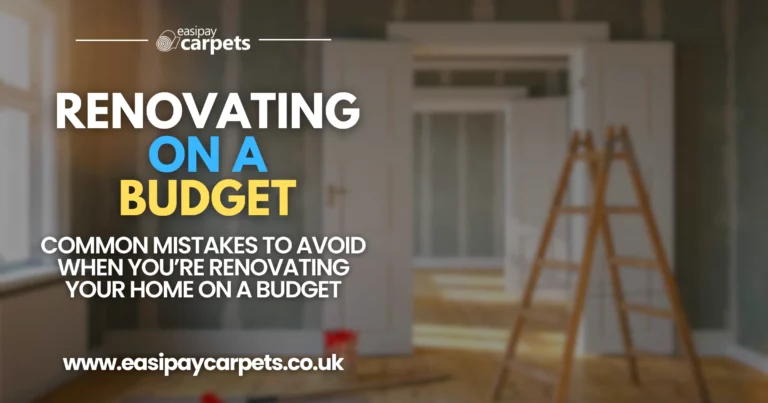

How to Stay on Budget During a Home Renovation: Avoid These Costly Mistakes
Renovating your home can be exciting, but it’s easy for costs to spiral out of control if you’re not careful. Whether you’re upgrading a single room or tackling a full house remodel, staying on budget is crucial to avoid financial stress.
Many homeowners overspend due to poor planning, unexpected expenses, or impulse decisions. In this guide, we’ll walk through practical strategies to keep your renovation costs in check and highlight common budget mistakes to avoid.
1. Set a Realistic Budget (and Stick to It!)
Before you start knocking down walls or buying materials, create a detailed budget that covers every aspect of the renovation.
How to Budget Smartly:
- Get multiple quotes for materials and labour.
- Break down costs (labour, materials, permits, furniture, finishing touches).
- Add a contingency fund (at least 10-20% extra) for unexpected costs.
- Prioritise spending—decide which elements matter most and where you can cut back.
✔ Avoid This Mistake: Not factoring in hidden costs like waste disposal, tool rentals, or temporary accommodation if major work is involved.
2. Plan Everything Before You Start
One of the biggest reasons for budget overruns is making last-minute decisions. Changing your mind midway through a project can lead to extra labour, material waste, and delays.
What to Plan Before Starting:
- Finalise designs before hiring contractors.
- Order all materials in advance to avoid delays and rushed purchases.
- Check measurements carefully to prevent costly mistakes.
- Choose your finishes early (flooring, paint, fixtures) to prevent price hikes or out-of-stock items.
✔ Avoid This Mistake: Starting work without a clear renovation plan, leading to unexpected changes that inflate costs.
3. Don’t Underestimate Labour Costs
Hiring professionals can be one of the biggest expenses in a home renovation. If you plan to DIY, make sure you know what you can realistically handle and what’s best left to professionals.
How to Manage Labour Costs:
- Get at least three quotes from different contractors before choosing.
- Ask for itemised pricing to understand where your money is going.
- Consider doing simpler tasks yourself (painting, installing flooring, assembling furniture).
- Hire tradespeople wisely—electricians and plumbers are worth the cost, but decorative tasks can be DIY.
✔ Avoid This Mistake: Choosing the cheapest contractor without checking reviews or qualifications—this can lead to poor-quality work and expensive fixes later.
4. Avoid Overspending on Materials
It’s tempting to go for luxury materials, but there are plenty of affordable alternatives that look just as good and last just as long.
How to Save on Materials:
- Compare prices online and in-store to find the best deals.
- Use reclaimed or surplus materials (Facebook Marketplace, Freecycle, local salvage yards).
- Consider laminate or vinyl flooring instead of expensive hardwood.
- Buy in bulk for discounts if you’re renovating multiple rooms.
✔ Avoid This Mistake: Buying everything brand new when second-hand or factory seconds could save hundreds of pounds.
5. Don’t Ignore Permits and Regulations
Skipping planning permissions or building regulations might seem like a money-saving shortcut, but it can lead to hefty fines and forced repairs later.
What You Need to Check:
- Do you need planning permission? (Major structural changes often require approval).
- Are you following building codes? (Electrical, plumbing, and insulation requirements).
- Will DIY work meet safety standards? (Poorly done electrical work can be dangerous and expensive to fix).
✔ Avoid This Mistake: Starting work without checking local regulations, leading to legal issues or difficulty selling your home later.
6. Watch Out for Hidden Costs
Unexpected costs can pop up at any stage of a renovation. Having a contingency fund will help cover these surprises without derailing your budget.
Common Unexpected Costs:
- Structural repairs (hidden damp, faulty wiring, unstable walls).
- Tool rentals (some jobs require special equipment).
- Extra labour costs if work takes longer than expected.
- Price increases on materials if you don’t buy everything upfront.
✔ Avoid This Mistake: Budgeting too tightly and having no cushion for unexpected expenses.
7. Don’t Rush the Renovation
Many homeowners try to rush the process, leading to costly mistakes and rework. Taking your time can actually save you money in the long run.
How to Pace Your Renovation Smartly:
- Tackle one room at a time to spread out costs.
- Wait for seasonal sales on flooring, furniture, and fixtures.
- Don’t start work until all materials are ready to avoid rushed, expensive decisions.
✔ Avoid This Mistake: Buying everything at once without shopping around for better prices.
8. Avoid Changing Your Mind Halfway Through
Making design or material changes mid-renovation can add unexpected costs, especially if work needs to be undone.
How to Avoid This:
- Stick to your original plan as much as possible.
- Choose materials and designs carefully upfront to avoid later regret.
- Get samples of paint, flooring, and fixtures before making final decisions.
✔ Avoid This Mistake: Ripping out newly installed features because you changed your mind, wasting money and time.
9. Be Wary of Cheap Deals That Are “Too Good to Be True”
If something seems significantly cheaper than similar options, be cautious. Poor-quality materials and rushed workmanship often lead to more expensive repairs later.
How to Spot a Bad Deal:
- Read reviews before hiring tradespeople.
- Inspect materials in person if buying second-hand.
- Check guarantees on work and materials before purchasing.
✔ Avoid This Mistake: Falling for low-cost deals that result in cheap, unreliable work or materials.
Conclusion
Sticking to a realistic budget during a home renovation is all about careful planning, smart spending, and avoiding common mistakes.
- Plan every detail before starting.
- Choose materials and contractors wisely.
- Have a contingency fund for unexpected costs.
- Tackle the project in stages to manage expenses.
With these money-saving strategies, you can transform your home without overspending.
Are you on the hunt for new flooring? With Easipay Carpets you can get the flooring of your dreams from as little as £10 per week, completely interest free! We offer Carpets, Vinyl and Laminate flooring with free underlay, door bars, carpet grippers and beading wherever needed on payment plans that spread the cost of the flooring into smaller, more manageable payments. Find out more at the button below!
Still Got Questions? Here's 10 FAQs!
At least 10-20% of your total renovation budget.
Look for end-of-line discounts, factory seconds, or pay-weekly options like Easipay Carpets.
DIY small tasks like painting, but hire professionals for plumbing, electrical work, and structural changes.
Labour, structural work, and high-end materials can be the biggest costs.
Check surplus building suppliers, online marketplaces, and seasonal sales.


